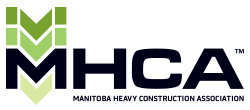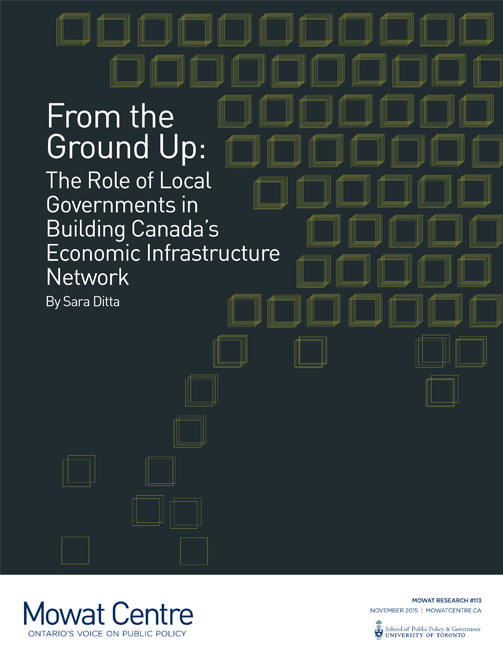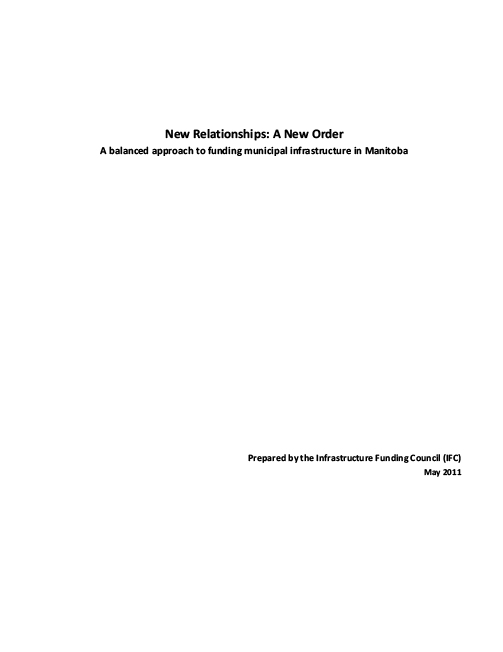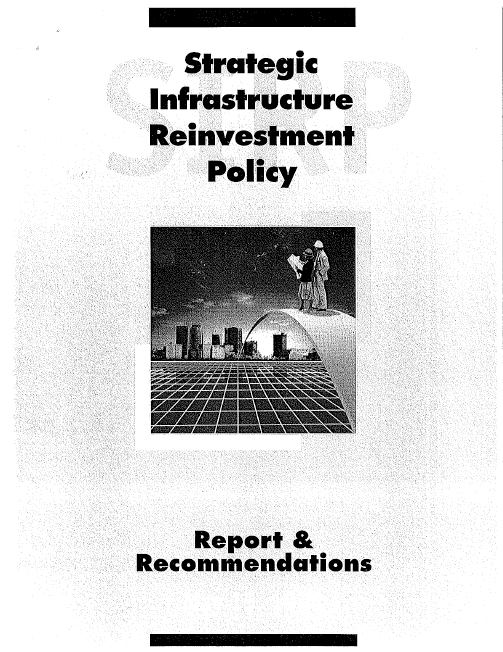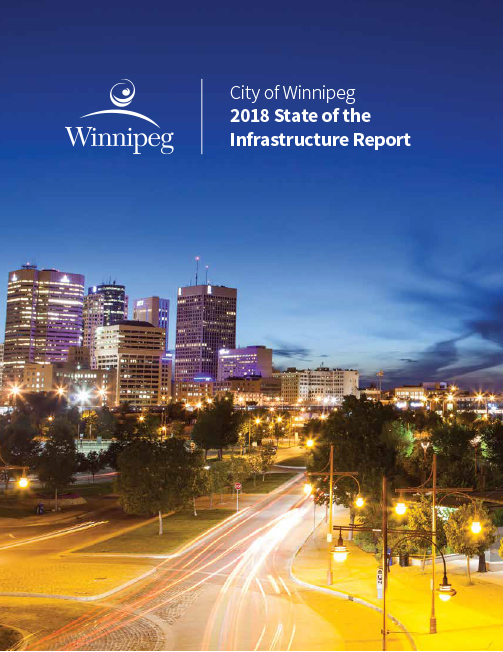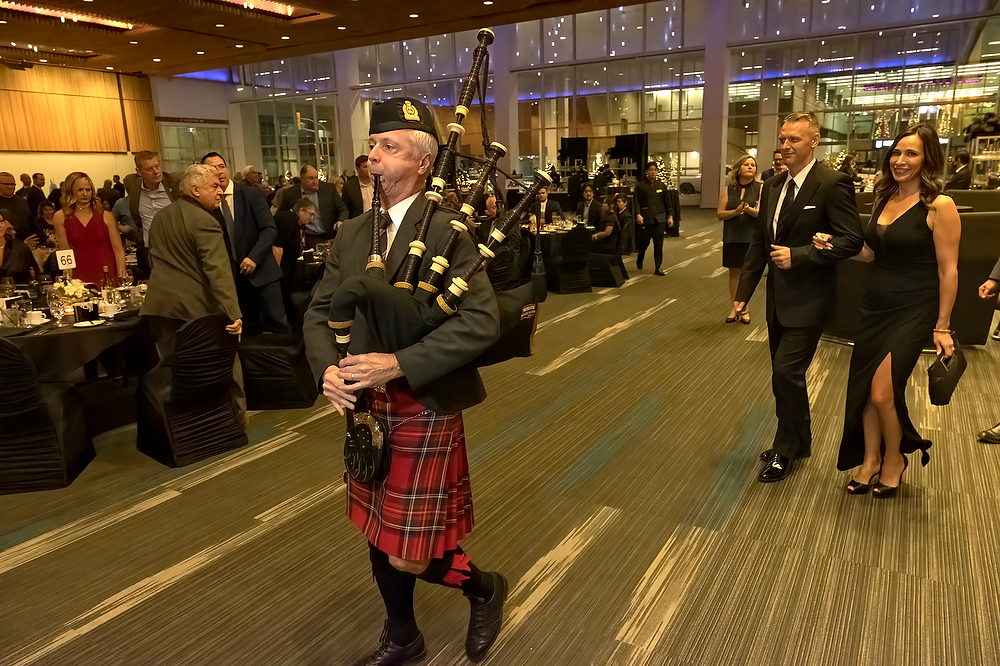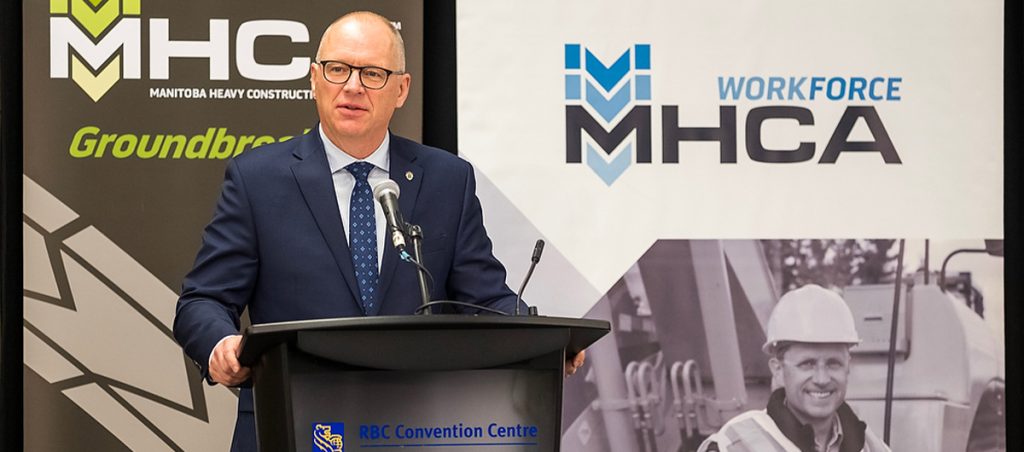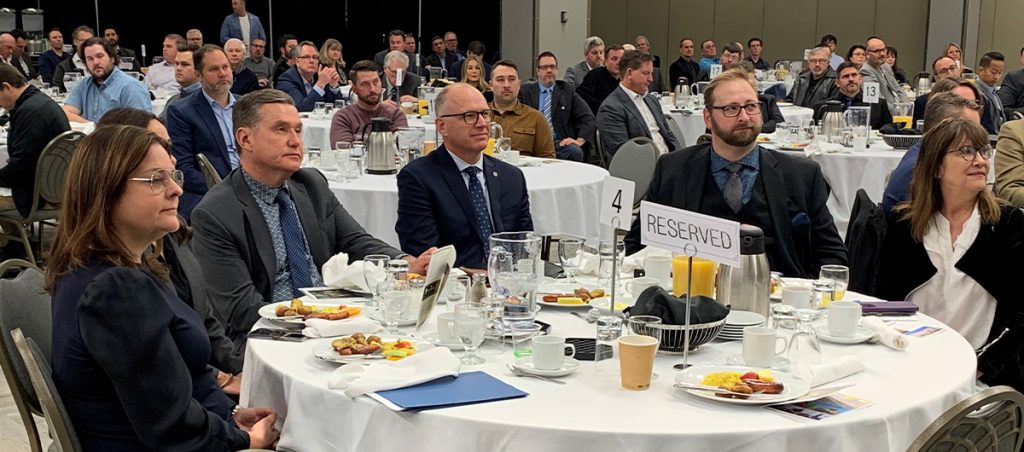Fix Our Roads!
Fix Our Roads is MHCA’s ongoing public awareness initiative to keep the need for core infrastructure investment – fixing potholes; improving roads – as a top public and political priority. This is done through the media, often via radio ads, and through efforts of our membership to speak directly to elected and senior officials of governments of all levels.
Our advocacy is rooted in principles of strategic infrastructure investment that grows the economy and is consistent with the best public interest.
Winnipeg’s road construction map – check out your neighbourhood here
CAMPAIGN HIGHLIGHTS
Radio ad campaign
Listen to the MHCA’s spring 2022 radio campaign ads.
‘You shouldn’t need an ATV to drive on our roads’
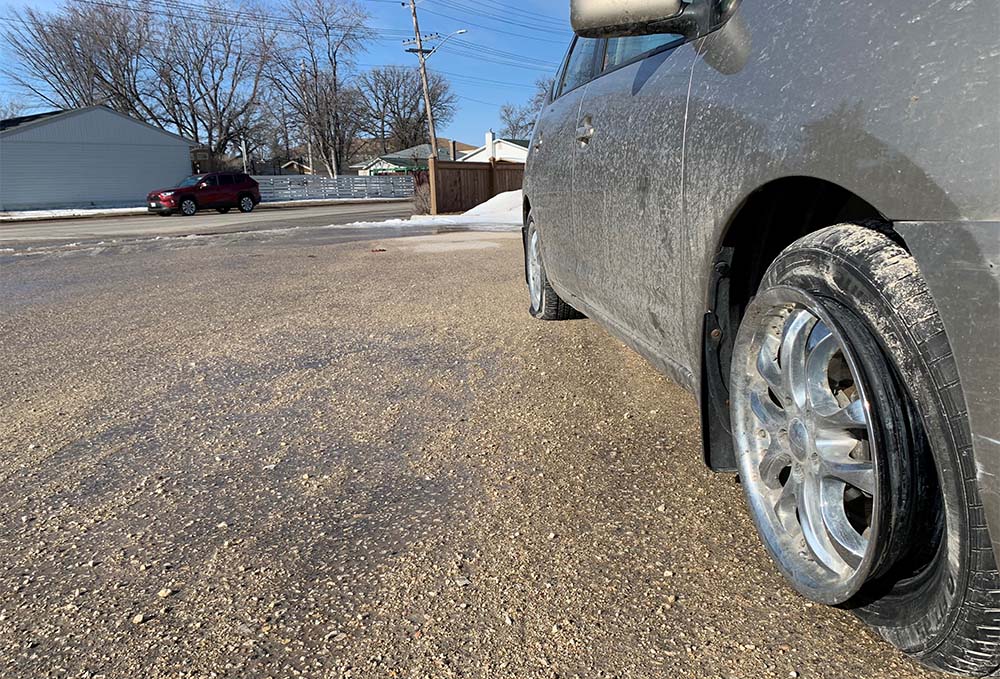
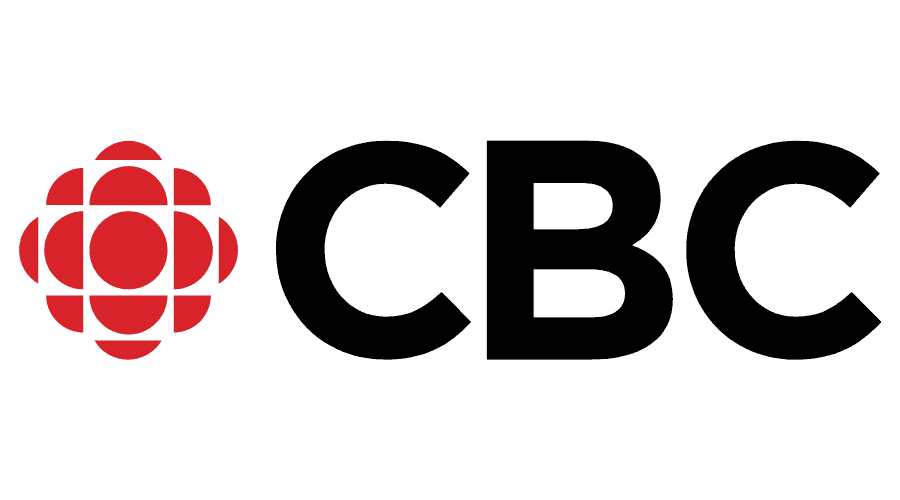
Listen here to Chris Lorenc on the long-standing problem with Winnipeg roads and why a pothole ‘quick fix’ is not the answer.
DRIVE THE CAMPAIGN FOR A NEW FISCAL DEAL FOR MUNICIPALITIES: MHCA
Read the President & CEO’s message here
Province hikes highways investment, presents three-year capital plan
Manitoba’s Budget 2022 sees the highways capital program increasing to $407.954 million, with an additional $60 million carried over from an under-expenditure of last year’s highways budget. Keep reading
MHCA Pre-budget submission 2022
MHCA Pre-budget submission 2022 submitted to Minister Fielding December 23, 2021 – view here
MHCA TO PURSUE $38 MILLION IN ‘LAPSED’ HIGHWAYS BUDGET
Manitoba would be better served if all unexpended budgeted dollars in the highways capital program were used in the same year or carried into future budgets, MHCA President & CEO Chris Lorenc said. Read more here.
The MI Budget Numbers – view here
WINNIPEG COUNCIL APPROVES 2022 BUDGET
Winnipeg City Council on December 15 approved, by a vote of 10-6, the 2022 Operating and Capital Budget which holds $164.7 million for local and regional road renewal, and confirms projected budgets for sewer and water main renewals. Read more here.
City of Winnipeg 2022 Draft Operating and Capital Budget – Local & Regional Street Renewal – view here
WINNIPEG DRAFT BUDGET STANDS PAT BUT SHIFTS ROAD REVENUES
The City of Winnipeg’s draft 2022 Operating and Capital Budget, released at the Executive Policy Committee today, sets out a total $164.7 million for local and regional street renewal next year, about $2-million more than the forecast published last year. Read more here.
‘TURN THE CORNER’ BUDGET
The Highways capital program should reach roughly $505 million this year and remain at minimum $500 million over each of the next two fiscal years.
The core Highways Capital program rises to a total $398 million.
MAKE MI A DRIVER OF ECONOMIC GROWTH, TRADE
The provincial government should uncap the potential of its Infrastructure department to drive trade and economic growth for Manitoba and join Western counterparts to make the West a trade superpower. Read more here.
MHCA SUPPORTS WINNIPEG BUDGET
Winnipeg needs to update its assessment of the condition of its streets and roads, and inform taxpayers how it plans to adequately fund the road and bridge renewal budgets. Read more here.
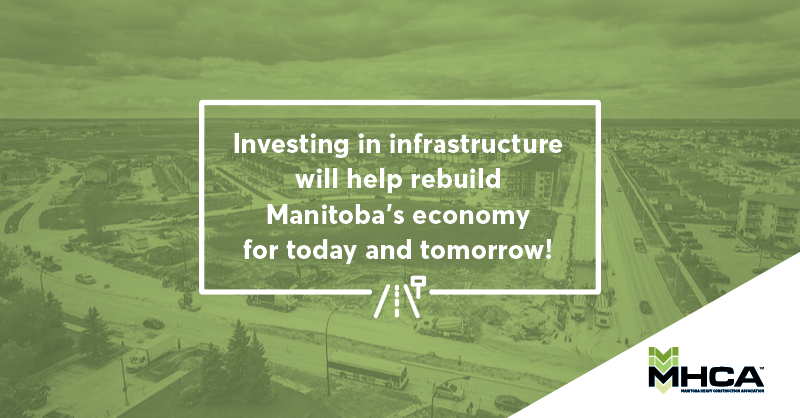
Post-Pandemic Economic Recovery Announcement
The Manitoba government on May 7 announced it would increase the infrastructure investment plans for the next two years by $500 million, of which will go to resurfacing and repairing highways, and to water & sewer projects.
Read the announcement here.

Province of Manitoba 2020 Budget
The Pallister government has increased the Highways Capital budget for 2020 by $12.5 million, to $362.5 million. In addition, it has “rolled over” $5.4 million worth of unexpended funds from 2019’s program. See the Budget Numbers here.
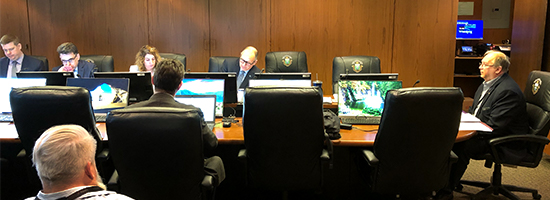
The Winnipeg Local and Regional Street Renewal budget
The MHCA in 2020 ensured the Local and Regional Street Renewal Budget did not lose ground, pushing back on the administration’s recommended cuts. This is MHCA President & CEO Chris Lorenc’s address to City Council and to the Executive Policy Committee.

The MHCA is looking for the support of members in our advocacy associated with Winnipeg’s 2020 Local and Regional Streets Program. Tell your councilors and Mayor Brian Bowman ‘enough with the cuts!’
Click here to read the full communication sent to members, along with how to contact City Council.
With the return of the Progressive Conservatives to government September 10, the MHCA is urging the province to start anew, rethink and rework the approach to core infrastructure investment. Manitoba needs a sustainable, multi-year plan to address our multibillion-dollar infrastructure investment gaps and move our province – and its municipalities – into a stronger, global trade position.
CAMPAIGN Archives
The MHCA asked the three main provincial parties about their commitments to investing in core infrastructure, should they form government September 10. Here are the responses from each party.
Trade is the heart of Manitoba’s economy, but trade can’t move without strong, reliable roads. This election, MHCA calls upon all parties to make strategic, sustainable infrastructure investment a priority of their campaign platforms.
- Infrastructure – the wise investment
The MHCA has called upon all party leaders to answer key questions about their views and party positions on core infrastructure investment. Read our Q&A here. - Highways budget cuts – impairing economic growth
In the 2016 provincial election and post-election, the Progressive Conservatives publicly committed to keeping the highways budget at a minimum of $500 million annually for strong economic growth. Since 2016, Manitoba’s highways have seen a total $326 million in budget cuts and under-expenditures. Review the numbers. - The economic case for strong infrastructure investment
Public opinion polls show consistently that Manitobans consider infrastructure a top public policy priority – they want their highways and roads in good shape. Infrastructure investment delivers amongst the highest economic returns, repeat economic analyses have shown. Read the findings of two such reports here and here. - Reframing infrastructure investment to grow our economy
MHCA advocates for infrastructure investment in keeping with the public’s best interest – an investment strategy that lays out how to maintain existing and build new core infrastructure that Manitoba needs to boost trade and meet the needs of a growing population. Read MHCA President & CEO Chris Lorenc’s letter to the Province of Manitoba, calling for a comprehensive review of how investment is done now and how it should be reframed. - Farmers need reliable roads to get their product to market
Bad roads are forcing Manitoba’s farmers are having to go further or change their destinations in getting their grain and produce to market. That increases their costs, and the price of groceries for Manitoba families. Read the recent statement by Keystone Agricultural Producers. - Growing the Economy – More to be Done
MHCA joins 9 other leading business organizations to press provincial parties to make growing our economy their No. 1 priority this election campaign. Read the 7 Pillars for Growing Manitoba’s Economy. - “Infrastructure is critical”: Richard Cloutier interviews Group of 10 business leaders on how to grow Manitoba’s economy with #7Pillars. Listen here.
Manitoba’s Budget 2019 sets the Highways Capital program at $350 million, that’s $150 million less than what was promised when the Progressive Conservatives were elected in 2016. Read the Budget 2019 story.
Click here to read a synopsis of the Budget 2019’s We should be investing more, incrementally, each year to fill the gap – the sinkhole funding for core infrastructure.
MHCA’s FixOurRoads gives the goods on ‘promises made/promises broken’ record of the provincial government on highways/infrastructure investment, since 2016.
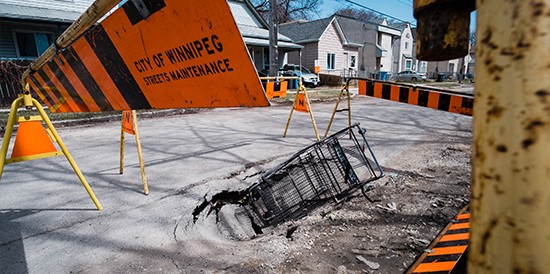
Photo Credit: Daniel Crump. A sinkhole opened on Pacific Avenue in early April. City councillors say constituents have made it known local street repairs is their priority.
Winnipeg’s residential streets took a huge hit this year, when City Council gutted the local street repair budget in a funding dispute with the provincial government.
The City is awaiting $40 million owed it from the just expired, five-year Manitoba Roads agreement, for work completed in 2018. Further, the province has not renewed the five-year roads agreement, meaning Winnipeg is out a forecasted $174 million from 2019-2024.
How did we get here?
December, 2017 Winnipeg City Council approves a 2018 capital budget that invests $116 million in local and residential streets. At the same time, that budget plan is shared with the province. The plan includes provincial dollars for Winnipeg roads, under a five-year funding agreement. Through the following months, the city seeks payment from the provincial roads agreement.
January, 2019
City of Winnipeg receives official letter from Broadway, indicating the provincial government does not agree it still owes $40 million, under a provincial roads funding agreement.
This triggers a series of budget votes in March 2019.March 1
Mayor Brian Bowman and Finance Committee Chair Scott Gillingham table the 2019 preliminary budget. That budget shows the city will spread the $40-million shortfall from the 2018 roads program evenly over 2019 and 2020. In addition, the province has not renewed the roads agreement, a five-year deal that would have seen another $28 million invested on residential streets in 2019, alone.March 7
Councillors learn all 53 residential street projects planned for 2019 and 11 lanes have been canceled. Some repaving will be done, but no significant repairs to residential streets.March 19
City council approves 2019 Capital and Operating Budget, axing $40 million+ from the local street repair program.March 25
City Council votes to restore $19.25 million for local streets repair, from the $44 million of surprise federal gas-tax top-up funding for 2019. That means 34 of the 53 street projects initially canceled will be tendered.
The MHCA to Winnipeg
It is irresponsible for City Council to eliminate residential street work this year, effectively putting Winnipeggers in the middle of a political funding dispute. Winnipeggers pay their taxes – 2% dedicated tax is levied each year, 1% for local streets and 1% for regional streets to fix their crumbling streets. Every budget has elasticity and contingency; find the funds to #FixOurRoads. Rally Winnipeggers to pressure Broadway to live up to the roads funding deal.
The MHCA to Manitoba
Make good on your commitments. Make Winnipeg whole for the $40 million owed.
Further, fulfill your obligation and renew the five-year roads funding agreement. The city cannot alone raise the revenues needed to maintain roads — the foundation of our trade-dependent economy. Municipalities do not have the financial resources or capacity to shoulder the burden of public infrastructure on their own. Municipalities collect just 8 cents of every tax dollar.
Make infrastructure a priority
Since 2016, the provincial government has reduced investment in core infrastructure by $421 million, in budget cuts for highways, municipal roads and bridges and land drainage.
You can’t cut your way to prosperity
– MHCA President Chris Lorenc
Our highways and urban streets are decaying, rapidly.
The decay is compounded by the fact neither the province nor the municipalities are investing enough in our transportation assets, to pull out of what is called an infrastructure gap – the difference between what we invest annually in roads and what is needed, to bring them to good condition.
- Manitoba’s infrastructure gap is $9 billion – highways and bridges.
- Winnipeg’s infrastructure gap is $3 billion – roads, streets and bridges.
- Manitoba’s total municipal infrastructure gap is $11 billion.
That our infrastructure investment deficit has become. We don’t need “pothole memes” as an embarrassing metaphor for the state of our infrastructure.
A bumpy compromise: Winnipeg puts gas tax top-up cash to local street budget
Winnipeg City Council voted on April 25 to allocate the bulk of the $43.9 million it is expecting from the federal gas-tax windfall toward the local streets program which was gutted in the city’s recently approved Operating and Capital budget. [keep reading]
Presentation to City Council
On March 20th Chris Lorenc appeared in front of City Council – read the presentation
Winnipeg eliminates residential street work in funding spat with province
MHCA to City Council: find a better Plan ‘B’
MHCA President Chris Lorenc told City Council’s executive policy committee this week Winnipeg cannot simply eliminate all residential street work for 2019, in response to the provincial government’s shortchanging the city on the cost-shared roads agreement last year. [keep reading]
No residential street work for Winnipeg in 2019? How is that possible?
MHCA pushes back on provincial short-changing, City of Winnipeg budget cuts
The MHCA has called upon Mayor Brian Bowman and City Council to restore planned investment in the local street renewal program for 2019, and future years, despite the provincial government’s reneging on funding commitments. That provincial decision shortchanged the city by $40 million in the 2018 local and regional street renewal budget, and would pull as much as $174 million from the city’s planning for street repairs, from 2019-2024. [keep reading]
Winnipeg approves budget, eliminates 53 street repair projects
Winnipeg city council approved its Budget 2019 Wednesday, eliminating all significant residential street repairs. That cancels 53 street and 11 lane projects that were planned for 2019. [keep reading]
Meanwhile, in Ontario and Saskatchewan, provincial governments have announced their economic plans ride on significant investments in infrastructure:
- “When we invest in smart infrastructure, we create jobs and grow the economy, shaping the future for hard-working families in Ontario. Our province is open for business and open for jobs.”
[keep reading] - “Our government is creating safer, and more fluid travel for people who travel on Saskatchewan’s highway network. This work will help local businesses compete, promote a higher quality of life for residents and support the long term economic prosperity of this province.” [keep reading]
- And from our stakeholder partner associations, more concern about the city’s cuts to residential street works this year and the Winnipeg-Manitoba dispute. [keep reading]
Transportation Infrastructure Reports
Read about the vital link between efficient, connected trade transportation infrastructure and economic health.
